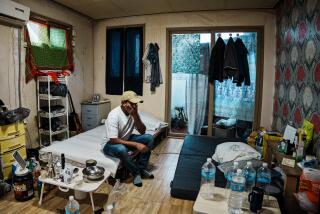Korea’s Working Women Fight for Rights, Own Union
SEOUL, South Korea — When Kim Na-na married a co-worker at Korea Chemical Co. last October, she knew her job was at stake. She was violating the company’s tradition of not employing married women.
The 25-year-old worker was let go soon after she returned from a weeklong honeymoon. Her husband, Chung Moon-soon, 33, was forced to resign after strongly protesting the firing. Both are now jobless.
Their employer, a floor-covering manufacturer, said she was fired for incompetence and her husband for being unfit for “the corporate culture.”
No one believed it. Although the company has never admitted having such a policy, workers there say it traditionally has not hired married women and fires any who do marry.
“What they said makes me feel sick,” Kim said. “Everybody knew I was being fired because I am a woman and got married. My husband was kicked out because he didn’t accept it.”
Park June-sang, Korea Chemical’s personnel director, declined to discuss Kim’s case specifically, but insisted there is no discrimination against women in layoffs made by the company.
The case is just one example of how vulnerable female workers are in South Korea’s job market. In a male-dominated corporate culture, women are usually the last to find jobs and the first to lose them, even though labor law prohibits sex discrimination.
Many women found work during the nation’s boom years because companies couldn’t find enough men. But since Asia’s economic crisis began two years ago, companies are cutting jobs and the victims are largely women.
In the last year and a half, Kim’s company, with a total work force of 1,800, laid off 150 workers. The company said 20% of them were women, although women represented less than 10% of its employees.
Korea Chemical said that it laid off workers based on job performance, not sex, and that it was a coincidence that women accounted for a higher percentage.
Kim and two dozen other women with similar experiences founded an activist group in January that educates women on their job rights and helps them take legal action against their employers.
It was a small but meaningful step in a country where the voices of female workers are rarely heard. All major Korean labor unions are dominated by men.
With only 60 members, the Seoul Women’s Trade Union has a long way to go to realize Kim’s dream of an organization powerful enough to improve women’s rights in the workplace.
But her union has helped 29 members receive a total of $42,000 in unpaid wages or other compensation.
Kim herself filed a petition with the Labor Ministry and received an extra six months’ salary from Korea Chemical, about $5,800.
“We need a union that speaks for women,” Chung Yang-hee, a spokeswoman for the group, said. “Not many women belong to labor unions. And the unions don’t fight for female workers’ rights anyway.”
The Federation of Korea Trade Unions, the nation’s largest umbrella labor group, boasts 1.2 million members, of whom about 30% are women. But among its 700 leaders, only 30 are women.
Kim has stopped looking for a job after months of fruitless efforts and is giving more time to her group, arranging seminars and doing research on the work environment for women at small companies.
“I know from my own experience how desperately women need help. And I am glad that I can help them,” Kim said.
Labor Ministry officials say few, if any, employers have ever been charged with gender discrimination because women can seldom document their cases.
To help protect female workers, the government offers job training, operates a hotline to take complaints and even promises financial support for companies that hire women.
Government figures say that as of March, 1.2 million men and 577,000 women were out of work. But that excludes 340,000 women who lost jobs and became full-time housewives last year. It also does not reflect a large number of women who were forced to move from full-time to part-time or temporary jobs.
Late last year, for example, nine commercial banks shed 16,049 employees, nearly half of them women, although women made up only a third of their combined work force. Many others were forced to become temporary workers.
More to Read
Sign up for Essential California
The most important California stories and recommendations in your inbox every morning.
You may occasionally receive promotional content from the Los Angeles Times.










